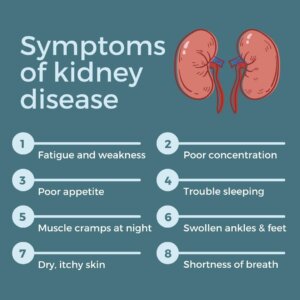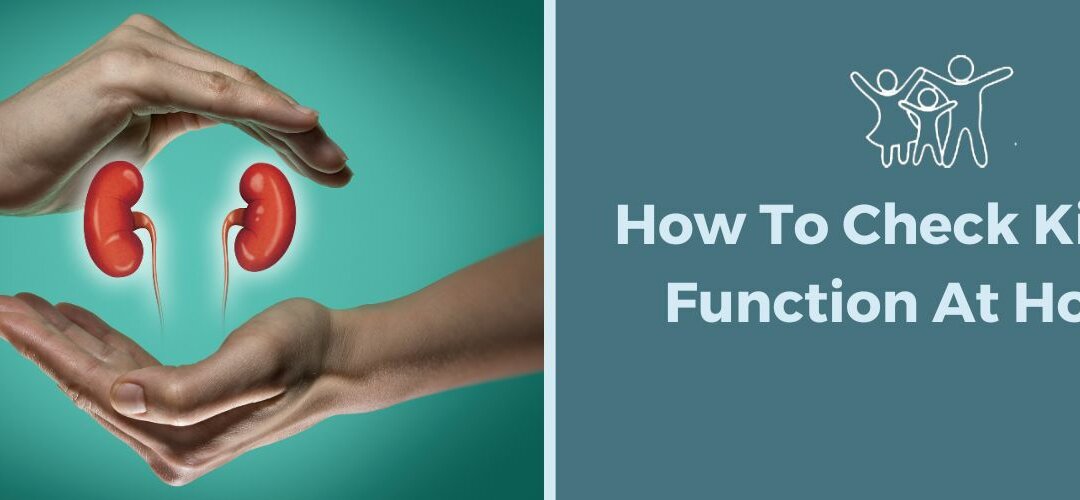When you gradually lose your kidney function, it results in chronic kidney disease or kidney failure. The kidneys filter waste and excess fluids from your blood and then remove them from your body in the form of urine. When you’re suffering from advanced kidney disease, it causes dangerous levels of fluids, waste, and electrolytes to build up in your body.
The buildup of waste and fluids in your blood can result in symptoms. You may not know you have kidney disease until it’s too late; that’s why taking a Kidney Function Test is essential to check up on your kidney health from time to time.
Suffering from kidney disease increases your chances of developing chronic illnesses like heart and blood vessel disease. These conditions develop slowly over a long time. However, detecting kidney disease early can help you manage the condition of your kidney and prevent it from worsening.
Progression of the kidney can lead to kidney failure, which will require dialysis or a kidney transplant to maintain life.
Symptoms of kidney disease
Some signs and symptoms can help you know you have kidney disease. However, these symptoms develop over time and depend on your kidney disease’s severity. Common symptoms include:
- Fatigue and weakness
- Poor concentration
- Poor appetite
- Trouble sleeping
- Muscle cramps at night
- Swollen ankles and feet
- Puffiness around the eyes in the morning
- Dry, itchy skin
- Often urination, especially at night
- Nausea and vomiting
- High blood pressure that’s hard to control
- Shortness of breath
- Chest pain
All these symtomms depend on how chronic your kidney disease is and where you have fluid buildup in the body. These symptoms are also non-s[ecific and can be caused by any disease.
How to check for kidney function at home
If you’re worried about your kidney function or want to be safe, a Kidney Function Test is your best bet. You can use this kidney function test at home and get instant results. The first step is to order your Kindy Function Test. You’ll receive it in the mail within three days.
You will then need to collect urine mid-stream using a collection container. The testing kit comes with a strip; dip it in the urine for under 2 seconds and ensure you wipe it against the side of the container to remove excess urine. Wait for sixty seconds, then read the results of your urine test. Don’t wait for two minutes, as it will interfere with your results.
This test is non-invasive and checks for albumin in the urine. Even though it won’t give you the exact measurements of those levels in your blood, it lets you know if they’re normal or not. When you dip the stick in urine, it changes colour, which will indicate if your levels are normal by changing the colour.
Suppose you have abnormal levels according to your test. You’ll need to consult your doctor for further testing and instruction on what to do. Your doctor will run additional tests to help you know what’s wrong with your kidney and how to manage it.
What causes kidney disease?
Chronic kidney disease is often a result of other conditions. These diseases often impair kidney function over time, causing the kidney damage to worsen over months or even years.
Conditions that can cause kidney disease include:
- Diabetes: This condition is result of high blood sugar levels. Over time, when it goes unmanaged, it damages the function of many organs in the body, including the kidney, eyes, nerves, and blood vessels.
- High blood pressure occurs when the blood pressure against your blood vessel walls increases. If the condition is poorly controlled or unmanaged, it can be the leading cause of strokes, heart attacks, and chronic kidney disease. Additionally, chronic kidney disease can also cause high blood pressure.
These two are the leading cause of chronic kidney disease. Other conditions that can cause it include:
- Glomerulonephritis
- Inherited kidney diseases like Polycystic kidney disease or others
- Vesicoureteral
- Conditions like kidney stones, some cancers, or enlarged prostate cause urinary tract obstruction.
- Interstitial nephritis
- Recurrent kidney infection
Risk factors of kidney disease
Some factors can increase your risk of getting kidney disease. These include:
- Obesity
- Smoking
- Diabetes
- Being Asian, black, or Native American
- Abdominal kidney structure
- Older age
- Frequent use of medications that can damage kidneys
- Cardiovascular disease
- Older age
- Family history of kidney failure
- Regular use of kidney-damaging medications
Kidney disease complications
When you suffer from chronic kidney disease, it tends to affect almost every part of your body. Potential complications from Kidney disease include:
- Anaemia
- Fluid retention results in arms, legs, high blood pressure, and fluid in your lungs.
- Decreased sex drive, reduced fertility, or erectile dysfunction
- Heart disease
- A sudden potassium levels rise in your blood
- Decreased immune response
- Pericarditis
- Weak bones
- Pregnancy complications
- Irreversible kidney damage
Kidney disease prevention
To reduce the risk of kidney disease, you can:
- Maintain a healthy weight: Being physically active will help you maintain a healthy weight. If you’re already overweight, your doctor will give you strategies to help you lose the extra weight.
- Quit smoking: If you’re not smoking, keep it that way. Cigarettes can damage your kidneys. With the help of a professional, you can find ways to quit smoking.
- Follow instructions on medications: When you purchase over-the-counter medications like painkillers, follow the instructions on the package. Excessive use of over-the-counter medicines can lead to kidney damage.
- Manage your medical conditions: With the help of a doctor, you can manage diseases or conditions that increase your risk of kidney disease.
Final thoughts
Millions worldwide have an increased risk of kidney disease. Early detection of kidney disease can help prevent the progression of kidney disease to kidney failure. Your kidney health is essential, and you can check it occasionally using this Kidney Function Test. This test is easy to take, and you can get instant results at home. If you’re worried about your results, your doctor will take further tests to help with diagnosis.


